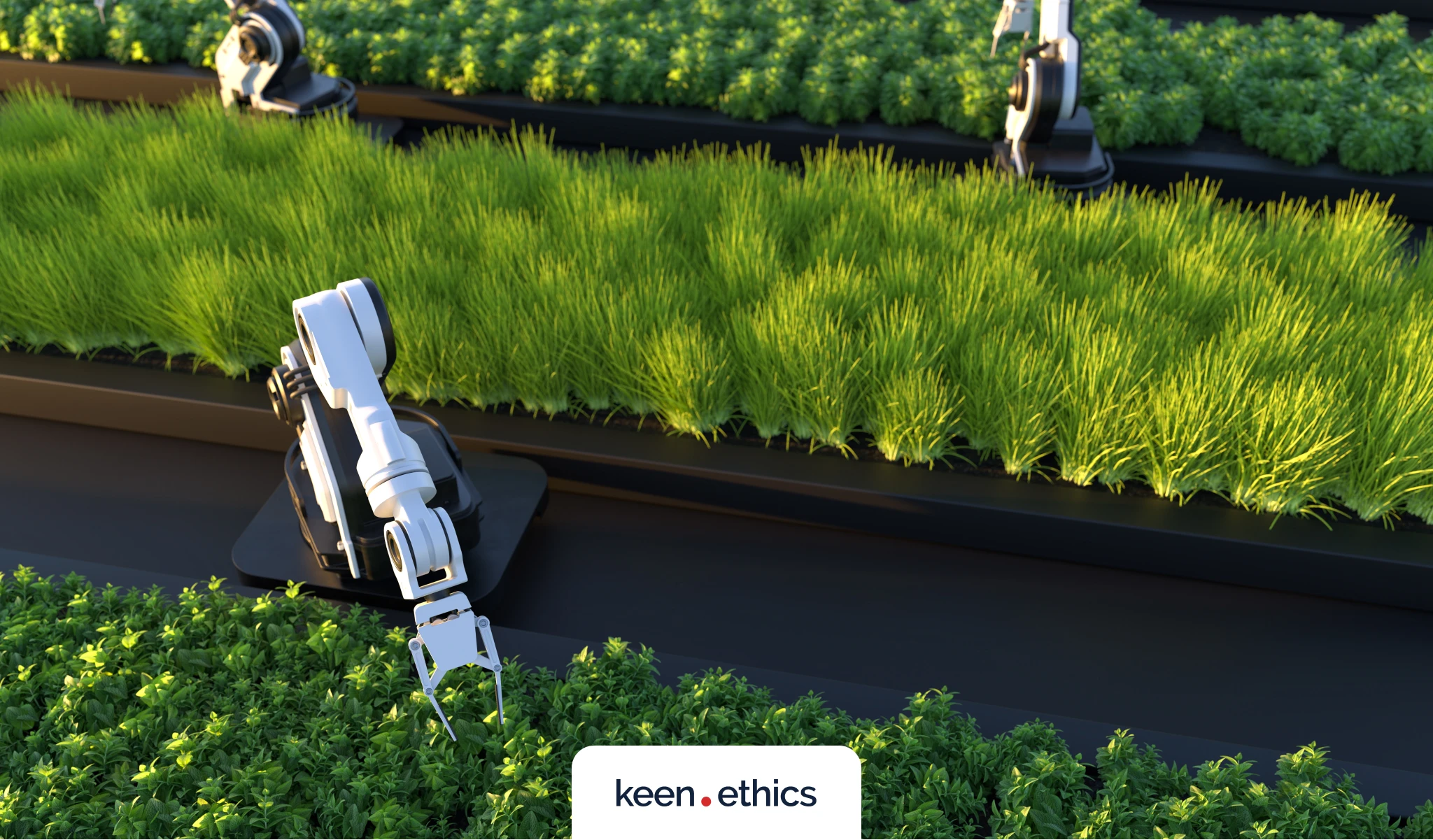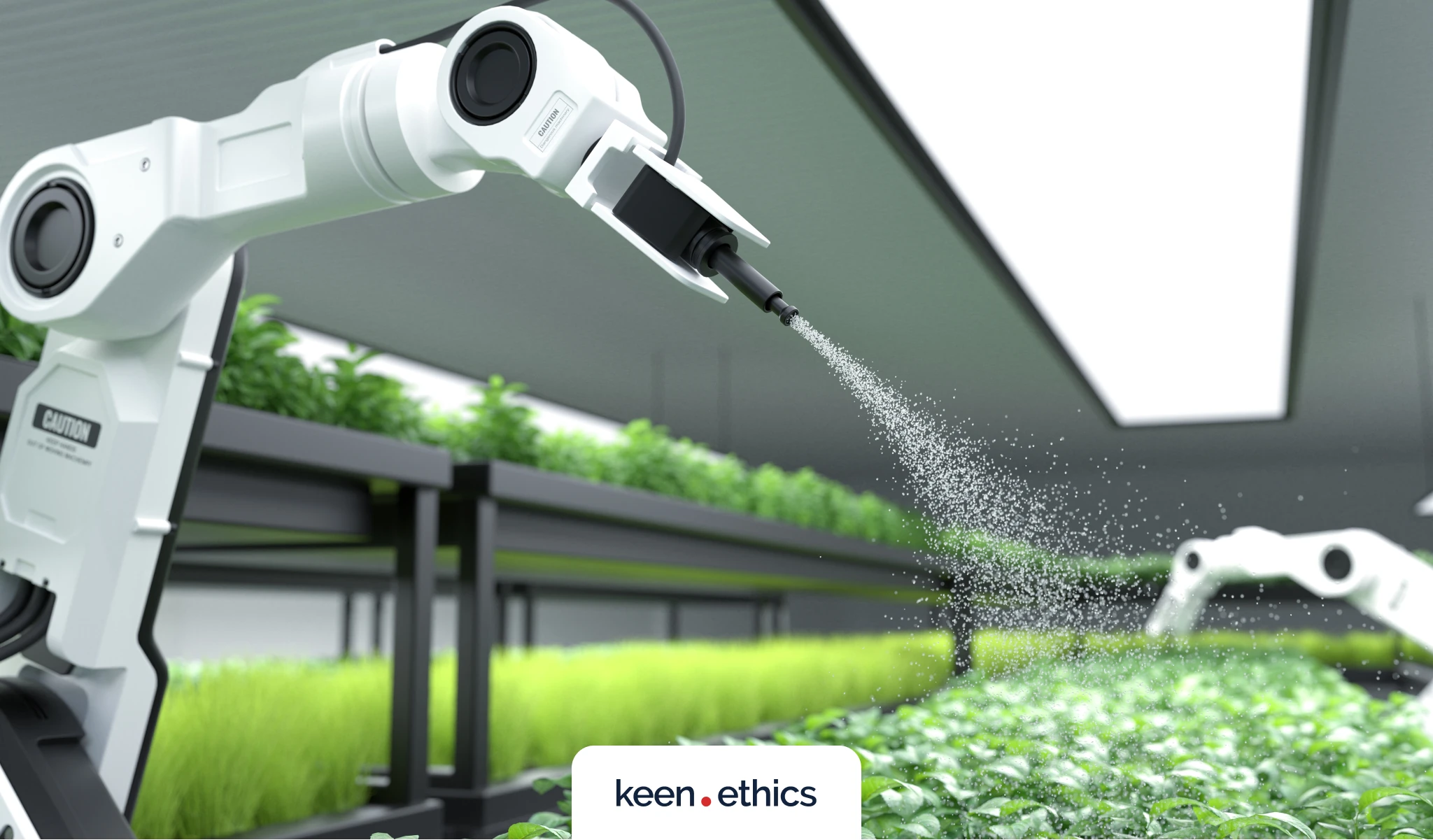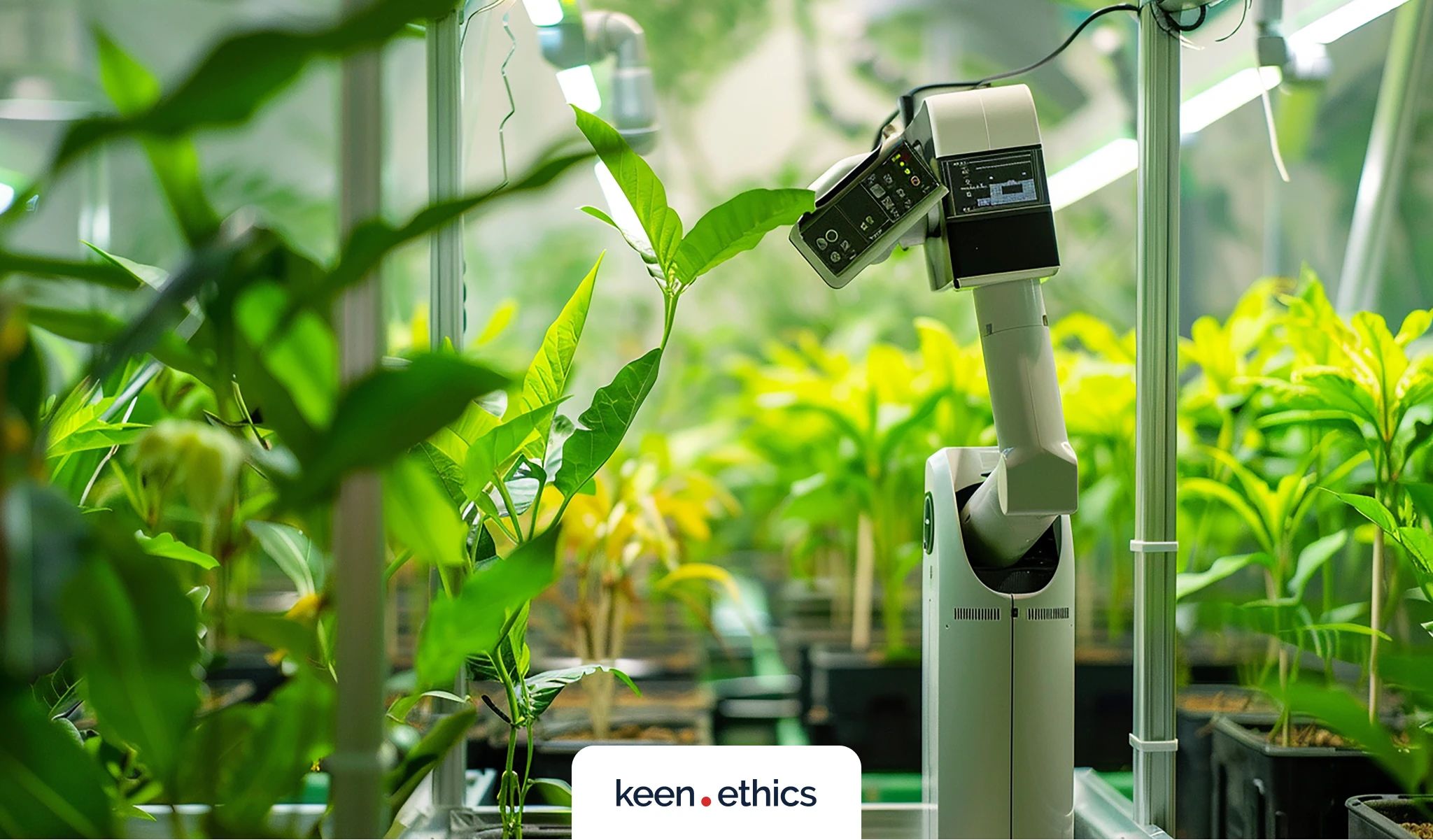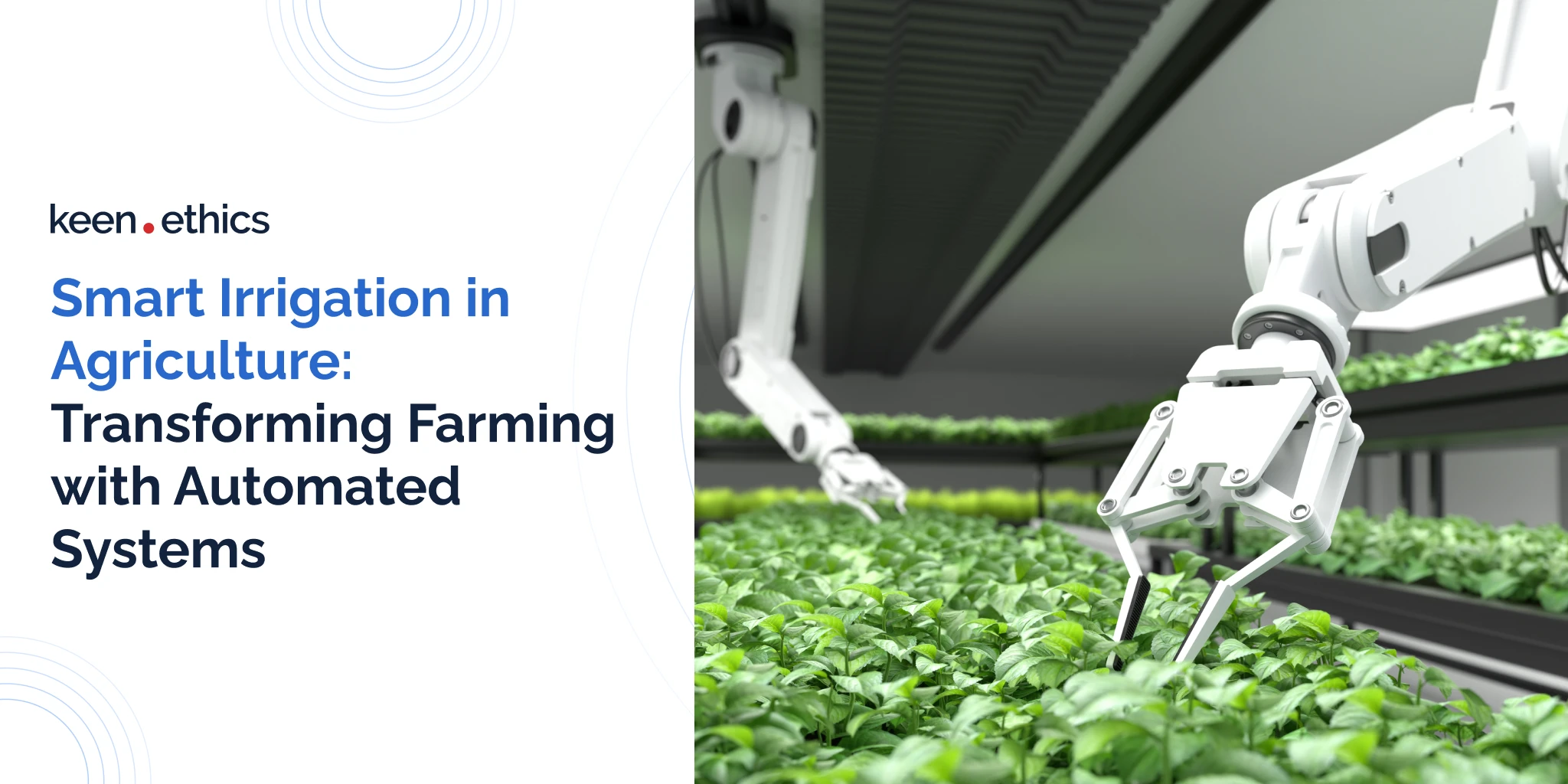Do you consider a smart irrigation system for your business? In this article, we’ll outline the core reasons to install this technology!
Irrigation is the foundation of our agriculture. Our crop yields, more or less, completely rely on our ability to create complex irrigation systems. While our infrastructure is highly optimized, there’s always space for more improvements through agriculture software solutions. In this regard, we want to discuss automated agriculture irrigation systems. Using technologies associated with AI, can improve your irrigation efficiency. This positive impact becomes possible through the prediction of weather conditions and other factors like soil moisture levels. Smart irrigation is also a perfect technology for promoting environmental sustainability. Learn how to manage it most efficiently in this article.
Smart Irrigation: How Technology Can Improve Water Management
One of the core obstacles for many irrigation schedules is water availability. Many regions that use irrigation face large-scale challenges with the availability of water resources. This is the case even in places with moderate climates. Water resources can get depleted there if used incorrectly, too. Smart irrigation systems for farming are a solution to the problem of scarcity. They allow you to maximize the positive impact per liter of water.
There are many ways to improve water management through advanced technologies. Firstly, one can use them to prevent unnecessary waste. Water leaks, for instance, are a common problem for farms. It’s possible to remove them altogether with the help of smart farming tech. Secondly, smart irrigation systems also have tools for analyzing crops in real time. This means that they’re capable of adjusting circle irrigation sprinklers based on real demand rather than some abstract models of crop growth. All this is crucial for maximizing the utility of water per kilogram of crops.
The Key Elements of a Strong Irrigation System

There are many types of irrigation systems on the market. In this review, we want to analyze features that you’re likely to encounter while working with the technology in question.
Prediction of weather conditions and water needs
The first vital technology in agriculture irrigation automation is predictive analytics. Modern agriculture tools are capable of analyzing vast databases to make advanced models of the future. What’s necessary to enable these functions? A combination of sensors, employee observations, and machine learning tools. Your sensors and workers are necessary to collect data on irrigation practices. Typically, this information falls into the domain of Big Data. It’s hard to analyze for humans due to its scope. In turn, machine learning algorithms can resolve this problem. They analyze tremendous volumes of information to then offer input on the most efficient irrigation methods.
One of the best ways to predict the future is to analyze the past. While past information doesn’t always offer accurate predictions, it achieves this in 90% of the cases. Weather systems and crop growth are a result of long-term evolution. They have many well-established patterns that are easy to find in the data. Consequently, if you supply your system with enough information, it’ll be able to make accurate predictions. Predictive analytics is among the core technologies for analyzing irrigation processes.
Precision farming through data-driven analytics
Every activity has periods during which certain processes are likely to be at peak efficiency. In many cases, finding those processes is extremely difficult. They’re hidden in the data and far from being obvious. The core benefit of smart irrigation in agriculture is its focus on data. You can analyze information from many farms to then create optimal farming patterns. For instance, some crops may grow better in June than in July. In this way, you get an opportunity to obtain an edge over traditional irrigation methods. Certain manipulations regarding irrigation may also be seen as a part of precision farming. Changes in irrigation are often sufficient to yield a major difference.
Sensors for soil moisture
Soil moisture levels often define whether certain crops will grow or not. As a result, knowledge about them is essential for any farm. Modern technological solutions in the field of smart irrigation systems help in this regard. You can use advanced algorithms to clearly understand soil moisture levels.
A combination of two technologies makes this possible. On the one hand, one should install field sensors and weather sensors to monitor various conditions. On the other hand, smart irrigation systems also need software. Machine learning algorithms with access to sensors are essential. They help analyze existing data about nutrient saturation and water levels and make predictions about future events on your farm.
Tools for monitoring crop health and diseases
Modern smart irrigation systems also have an extensive set of tools for monitoring crop health and diseases. You can connect your Artificial Intelligence (AI) network to multiple types of sensors. Firstly, ground sensors will help with detecting abnormalities in resource consumption. Diseased crops are likely to have different environmental impacts. Secondly, drone systems may also assist you significantly. They can spot large-scale changes in crop structures. In this way, smart systems can alert you about negative situations. The core aim of AI-based smart irrigation systems is to streamline the data and make it as easy to access as possible.
Instruments for remote monitoring and control
Modern farms typically encompass large amounts of space. In this light, you can greatly benefit from tools that streamline control over them. For example, modern farmers may use mobile applications to receive information. Smart irrigation systems are capable of updating data for them in real-time. In this way, experts get to combine automatic irrigation systems with, more or less, full control over farms. Using various prediction tools, it’s easy to make informed irrigation decisions.
Key Reasons to Install Smart Irrigation Systems

There are multiple significant reasons to install smart irrigation technology. Let’s review them in depth:
Real-time centralized administration
The first reason to install smart irrigation systems is their advanced irrigation approach. In this regard, you get an opportunity to start real-time centralized administration. Firstly, it’s possible to monitor changes in your systems on a minute-to-minute basis. Many smart irrigation systems offer updates once every five minutes or even faster. Secondly, an additional reason to use agricultural irrigation is centralization. Digital tools allow collecting all data about farm productivity in one place. Using this information, it’s much easier to make decisions that bring the highest degree of economic benefits.
Increased efficiency of hydraulic systems
Many hydraulic systems used in farms are far from being efficient. Access to engineering specialists is scarce. As a result, many businesses on the market use suboptimal approaches. Modern smart irrigation systems finally close the outlined gap. How do they achieve this? Primarily, by monitoring your hydraulic systems and comparing them against the most efficient industry practices. This factor proves the key role of software in improving long-term impacts on agribusiness. They enable many companies to optimize systems that require too many investments.
Optimized water consumption
Water consumption is the core aspect of every agricultural system. In this regard, we recommend using intelligent algorithms to optimize it. Ultimately, there are many ways to improve the presented sector. You can remove unnecessary water leakages, which are widespread in agriculture. There’s also an opportunity to maximize the impact of one liter of water per kilogram of crops. Modern systems have many built-in frameworks for analyzing the requirements of your crops. Considering all these factors, automation for farmers is among the core technologies to invest in the current market.
Optimized energy consumption
Current technologies also enable optimized energy consumption. What do we recommend in this respect? An agricultural solution requires investments in power systems for hydraulics. You can use AI to switch on and switch off various energy systems to maximize their positive impacts and minimize energy consumption. In the case of greenhouses, for instance, one can also control light systems to optimize the benefits of their use. In short, digital solutions are essential for maximizing long-term benefits for your firm.
Improved billing management
Farming industry encounters numerous financial activities. Automation in farming assists with optimizing them. For example, the ability to automate the payment of bills is among the core benefits of a smart irrigation system. Instead of having to go through every water payment and approve them manually, you can push the tasks in question to the smart agriculture systems. This approach is probably going to cut operational costs. How exactly? Above all, through its ability to remove the need for additional workforce.
Increased crop yields
The optimization of the processes that were out of human control in the past is essential for improving crop yields. Modern systems for smart irrigation can analyze agricultural conditions and create optimal environments for this field. The results of changes include cost reductions and, more importantly, improved yields. Modern irrigation systems are capable of boosting the number of crops raised per dollar. In our opinion, the technology will play a crucial role in the future improvements within the agricultural field.
Better plant health
Lastly, a combination of sensors with AI technologies is almost certain to boost plant health. The improvements are likely to come from two sources. Firstly, better irrigation operations can improve the long-term state of plants. Diseases usually hit crops that don’t receive enough water and nutrients. Secondly, sensors can also analyze the overall well-being of the plants. Using this information, the core decision-makers can quickly choose if there’s a need for some interventions or not. Hence, the long-term outcome of investments in AI-based irrigation systems is the improvement in crop yields through better crop health.
Agriculture Automation

Agriculture automation concerns many fields in the sector. There are many types of solutions that you can automate these days. Here are some of the core technologies that benefit from such innovations:
1) Farm management and agriculture drone software;
Conclusion
To summarize, an investment in irrigation software is highly worth it. This technology can boost crop health and optimize the usage of water. Irrigation is a technology that requires a lot of engineering expertise. Since there’s always a deficit of engineers, the presented information means that this innovation is essential for optimizing your business.
FAQs
What advantages does AI in agriculture bring about?
In our opinion, here are some of the core advantages of using AI in agriculture:
1) Promoting precision farming
2) Automating crop monitoring and disease detection
3) Automating all types of machinery and robotics
4) Enabling predictive analytics for yield optimization
5) Creating complex smart irrigation systems
What does SaaS in agriculture stand for?
It’s the usage of subscription services based online within the agricultural field. For instance, you can subscribe to some agriculture AI with the help of modern tools.
What future does AI in agriculture have?
In our opinion, it’s very positive. AI will become more complex, offering even greater analytical capacity.
Keenethics is here to help!

























